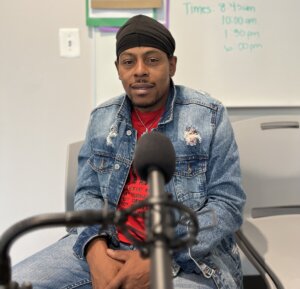‘Where it gets complicated’: What needs to be done to curb ‘rampant homelessness’ in DC area
‘Where it gets complicated’: What needs to be done to curb ‘rampant homelessness’ in DC area
The D.C. region had bucked the national trend of rising homelessness for years, seeing a consistent decrease in the homeless population year after year starting in 2019. That ended in 2023.
A recent Metropolitan Washington Council of Governments report found an 18% increase in homelessness across the Greater Washington area between 2022 and 2023. Suburban areas saw the largest increase.
For Donald Whitehead, executive director of the National Coalition for the Homeless, this latest spike wasn’t a surprise.
“We’ve seen dramatic increases in housing costs all across the country, especially in this region. Year over year from 2020 to 2021, housing costs increased by 18%,” Whitehead said. “What we’ve seen is more people in unsheltered homeless situations, and it’s continuing to grow since those COVID resources weren’t on the table.”
The one-two punch of rising rents and the evaporation of COVID-19 relief programs are too much for people to stay afloat, Whitehead said.
But what could be more concerning is what Whitehead calls a growing apathy toward people living on the street.
“It’s become such a normal issue in this country. When I was a young man, in the ’60s and ’70s, this kind of rampant homelessness was not in existence,” Whitehead said. “We didn’t see tents on the sidewalk. We didn’t see people living in parks, but now it’s almost become accepted.”
But it doesn’t have to be this way, Whitehead said.
“Our country has to be one that doesn’t accept people living on streets and sidewalks in the richest country in the world,” he said.
One of the more visible signs of homelessness are encampments in public parks and squares. So far, D.C. has dealt with this growing number of encampments by clearing them as they pop up across the city, while offering the residents housing options. Last spring, nearly 80 homeless people were driven out of their tents in McPherson Square near the White House.
Andre Townsend, 45, was one of them.

“My biggest fear was like what are we going to do, we’ve got all this stuff,” Townsend said. “Like, man, where are we going to go.”
To Whitehead, encampment clearings don’t help anyone.
“We are wasting taxpayer dollars,” he said. “When we dismantle those encampments, we not only take away that safety, that sense of community, we take away the very things they need for survival, like tents and whatever other supplies. Sometimes we even throw away their medical supplies.”
Townsend is from Northeast D.C. and fell into homelessness after getting out of federal prison. When he returned home, a family dispute left him with little money and an ongoing drug problem that only worsened.
“I’ve been through a lot out there on the streets,” Townsend said. “You be loyal to people and they just stab you in the back as soon as you blink your eye. But I’m a strong individual and I wasn’t content with my living arrangement, living out on the curb.”
Since the clearing, he has found a roof to live under through the Friendship Place housing service.
“You don’t know how good it feels to get have peace of mind, be quiet, shut the door and read a book with the TV off,” Townsend said.
Townsend said he has a long way to go, but he wants to get his own apartment soon and start a trash collection business.
Whitehead said it’s stories such as Townsend’s that prove homeless people want to get off the street and that homelessness is solvable.
“The truth is they’re human beings, just like any of us, with the possibility to succeed if we give them the resources they need to get to the next level,” Whitehead said.
He knows this from personal experience.
“I experienced homelessness myself,” Whitehead said. “That feeling of invisibility, of feeling that people are looking past you or around you. Sometimes even the feeling that people are looking right through you.”
Both Townsend and Whitehead said it was the love and support shown to them by volunteers and public case managers that got them out of homelessness. And Whitehead said it’s not about charity.
“Homelessness is not a moral issue — it’s an issue that is structural,” Whitehead said. “If I help people get out of this unfortunate situation, it not only benefits that person who’s getting out of homelessness, it benefits the community as a whole.”
Whitehead said the pandemic taught people how homelessness may be ended through housing programs and eviction moratoriums.
“COVID actually showed us a pathway to resolving homelessness,” Whitehead said. “It’s simple in what we need to fix homelessness. The complicated part is getting our elected officials to make that a priority. That’s where it gets complicated, changing hearts and minds of those we elect to make these decisions.”
Get breaking news and daily headlines delivered to your email inbox by signing up here.
© 2023 WTOP. All Rights Reserved. This website is not intended for users located within the European Economic Area.







